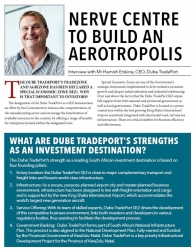
Nerve Centre to Build An Aerotropolis : Interview with Mr Hamish Erskine, CEO, Dube TradePort - Pivot RSS Nerve Centre to Build An Aerotropolis : Interview with Mr Hamish Erskine, CEO, Dube TradePort - Pivot2017-06-09 THE DUBE TRADEPORT’S TRADEZONE AND AGRIZONE HAS BEEN DECLARED A SPECIAL ECONOMIC ZONE (SEZ). WHY IS THAT IMPORTANT TO INVESTORS?
The designation of the Dube TradePort as a SEZ demonstrates an effort by the Government to enhance the competitiveness of the manufacturing sector and encourage the beneficiation of available resources in the country, by offering a range of benefits for enterprises located within the designated zone. Special Economic Zones are one of the Government’s strategic instruments implemented to drive inclusive economic growth and deepen industrialisation and industrial rebalancing. Over and above the fact is that the Dube TradePort SEZ enjoys full support from both national and provincial government as well as local government. Dube TradePort is located in a prime coastal area within the fast growing King Shaka International Airport seamlessly integrated with intermodal road, rail and sea infrastructure. These are critical enablers for business efficiency and effectiveness. WHAT ARE DUBE TRADEPORT’S STRENGTHS AS AN INVESTMENT DESTINATION? The Dube TradePort’s strength as a leading South African investment destination is based on four founding pillars:
The following makes Dube TradePort SEZ unique and very important to any investor:
Yes, TradeZone One is fully leased, attracted approximately R1.08 billion investments in the zone and has led to the creation of 9 880 jobs in the South African economy (both direct and indirect jobs), of which 7 395 have been created within KwaZulu-Natal. TradeZone Two is currently under construction process and is going to be released in phases during 2018 and 2019 with its first phase ready for the top structure development. There is a pipeline of approximately R3 billion in investments. Dube TradePort has already signed a lease agreement with one of the biggest pharmaceutical companies, Cipla Biotech Company. The Cipla facility will be South Africa’s first biotech manufacturing facility for the production of biosimilars with an estimated investment value of R1.3 billion, which will create more than 300 direct permanent jobs. This state of the art facility is set to produce a range of affordable treatments for cancer and other autoimmune diseases for the African and global market. This enhances the development of the pharmaceutical cluster within Dube TradePort SEZ. Already, more than 16 investors ranging from pharmaceutical, electronics and general manufacturing are lined-up to locate in TradeZone Two. WHAT PRIORITY SECTORS DOES DUBE TRADEPORT FOCUS ON? The targeted Priority Sectors include:
Yes, Dube TradePort SEZ is working closely with the Department of Trade and Investment Aerospace development programme to enhance the manufacturing and assembling of value-added manufactured products and services e.g. maintenance, repair and overhaul (MOR) services. WHAT IMPACT DOES DUBE TRADEPORT HAVE IN THE REGION AS A CATALYST FOR ECONOMIC TRANSFORMATION? Dube TradePort’s transformational goals are embodied in the organisation’s strategic documents including the B-BBEE strategy, which focuses on black industrialists and property developers and other procurement imperatives. With an annual average spend of R 400 million on infrastructure Dube TradePort has the potential to have a sizable impact on the national transformation agenda through the manner in which it procures goods and services. Currently, a total of five companies qualifying for the black industrialist programme are operational within the zone and more black industrialists are expected to operate in TradeZone Two. Of the contracts that we issue 95% have a 15-35% black share through joint venture arrangements that are a condition of the awards. Since the beginning of April 2017 alone we have awarded some R56 million to black owned businesses. In addition, in line with the Dube TradePort B-BBEE strategy, more black developers are targeted for property development. There is a good appetite in the market of black developers interested to do business with Dube TradePort. This is very exciting. HOW DOES DUBE TRADEPORT IMPACT ON SMALL BUSINESSES' ROLE IN THE SUPPLY CHAIN IN THE REGION? Dube TradePort undertakes training for emerging enterprises. This extensive programme covers many disciplines wherein entrepreneurs and staff of these enterprises receive formally recognised qualifications. Knowledge gained yields positive impact on their ability to run a business more effectively, in a manner that will allow them to gain access to financial instruments like loans and overdrafts, and actually compete for government and private sector work. There is also a mentorship programme and other forms of financial assistance that provide critical resources for them to be able to undertake projects on jobs that they have been awarded through Dube TradePort. WHAT DO YOU BELIEVE HAS BEEN THE KEY CONTRIBUTOR TO DUBE TRADEPORT’S SUCCESS? The development of Dube TradePort is integrally linked to that of all our partners be it provincial and local government or our development partners, Airports Company South Africa and also Tongaat Hulett. GENERAL BENEFITS FOR BUSINESSES TO OPERATE WITHIN DUBE TRADEPORT’S SEZ Preferential 15% Corporate Tax
Primary objective: provide capital towards bulk and related infrastructure that leverages investment from third parties.
Global competitiveness through incentives
|
Nerve Centre to Build An Aerotropolis : Interview with Mr Hamish Erskine, CEO, Dube TradePort - Pivot
Copyright © 2024 KwaZulu-Natal Top Business